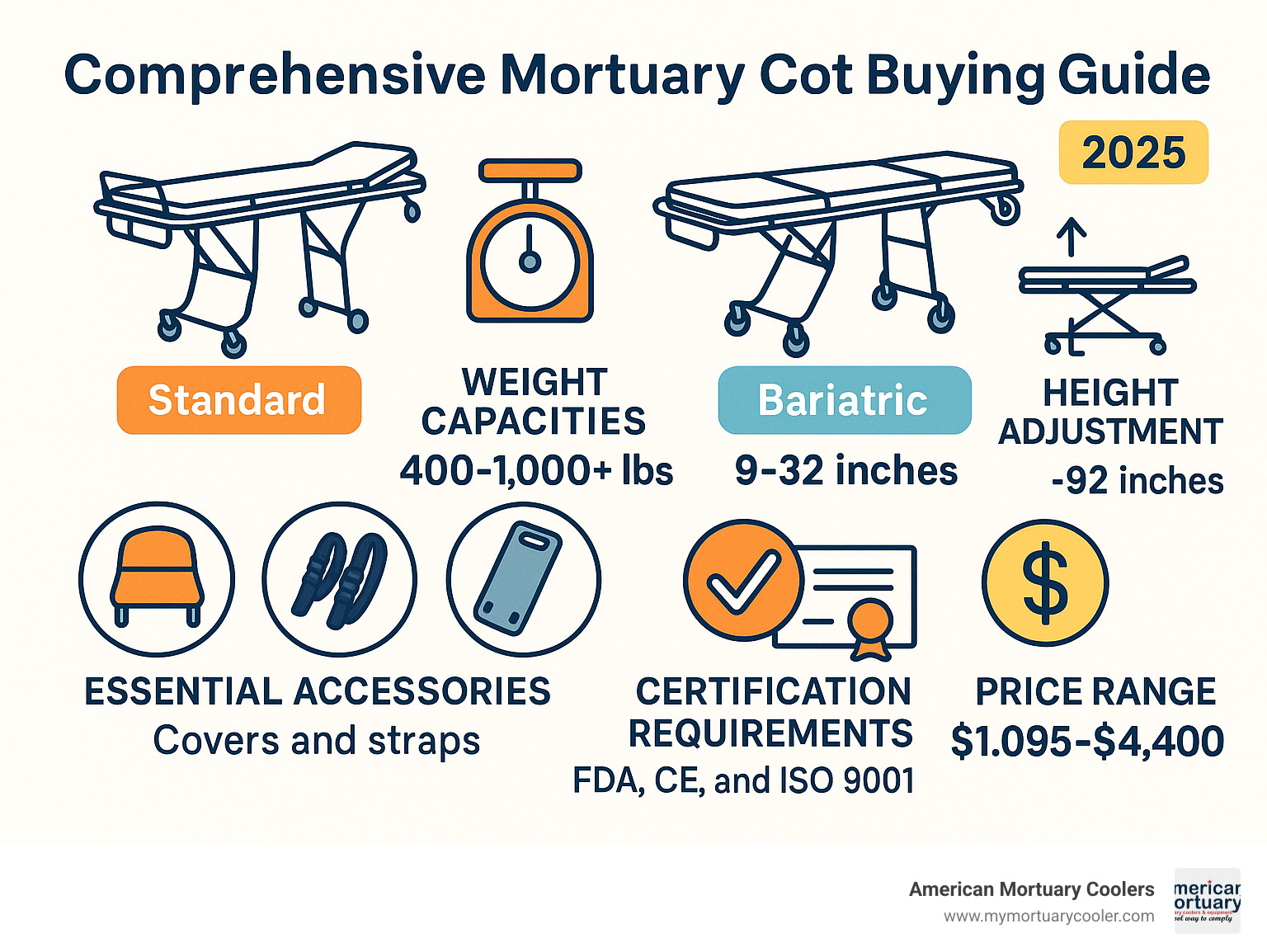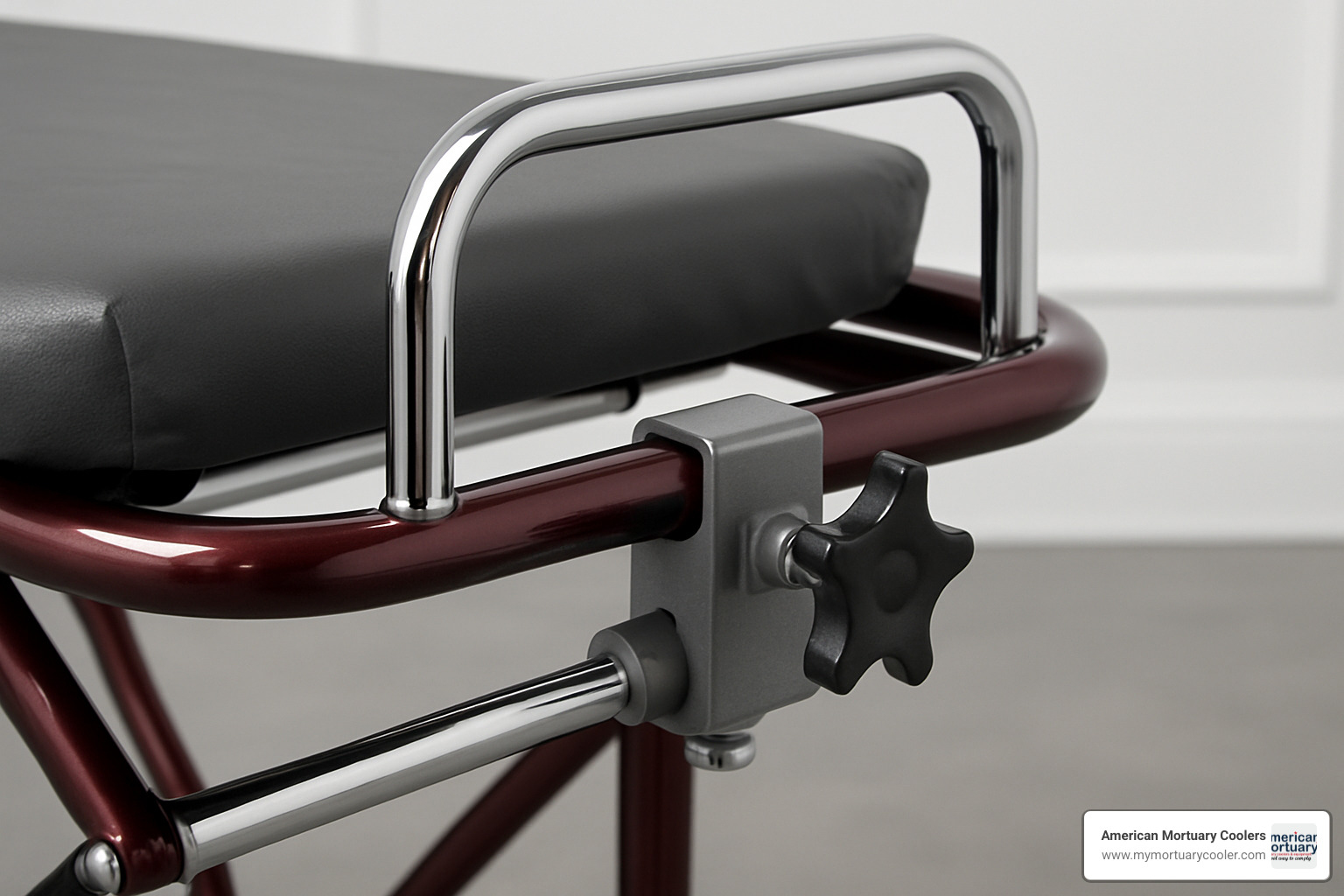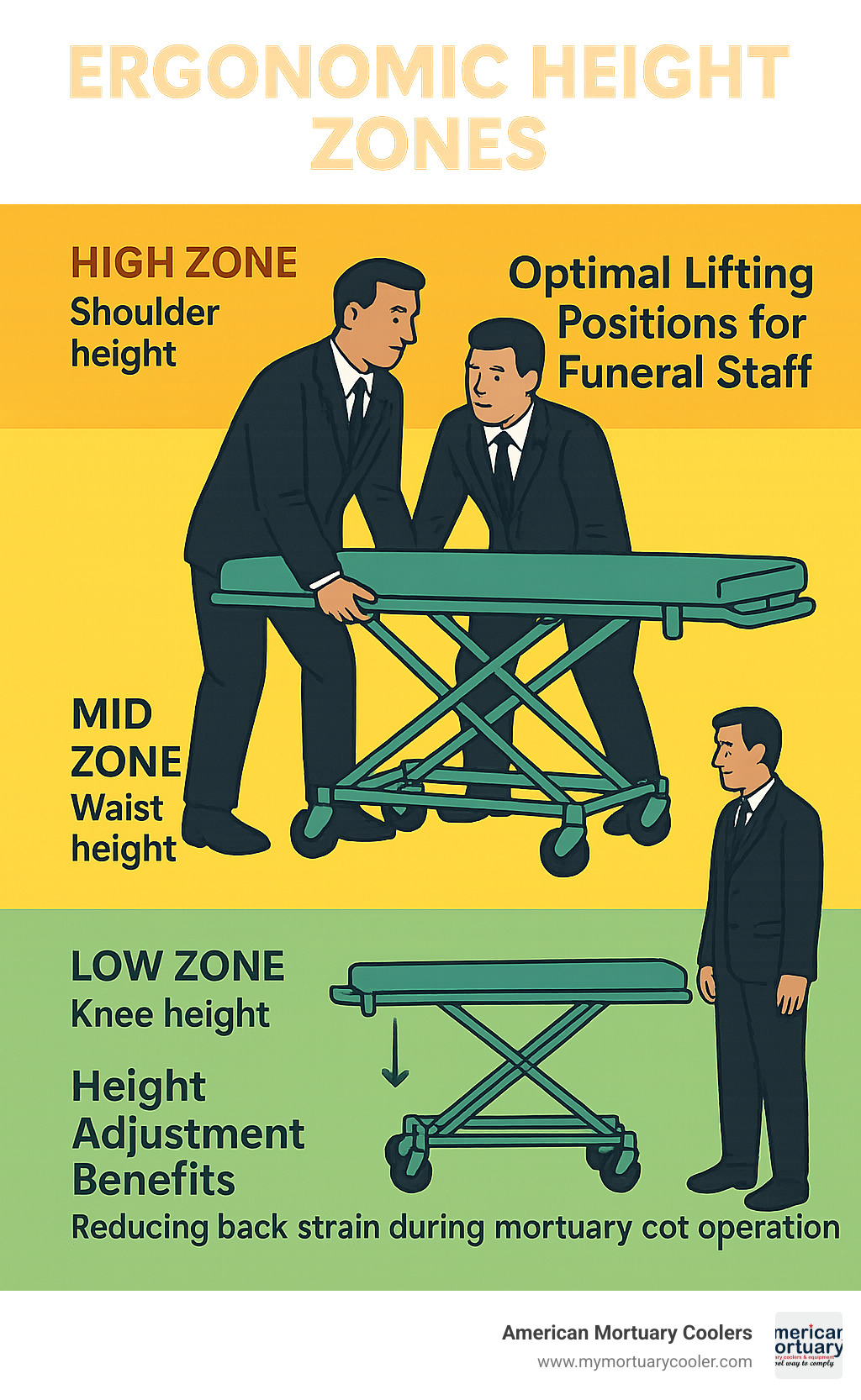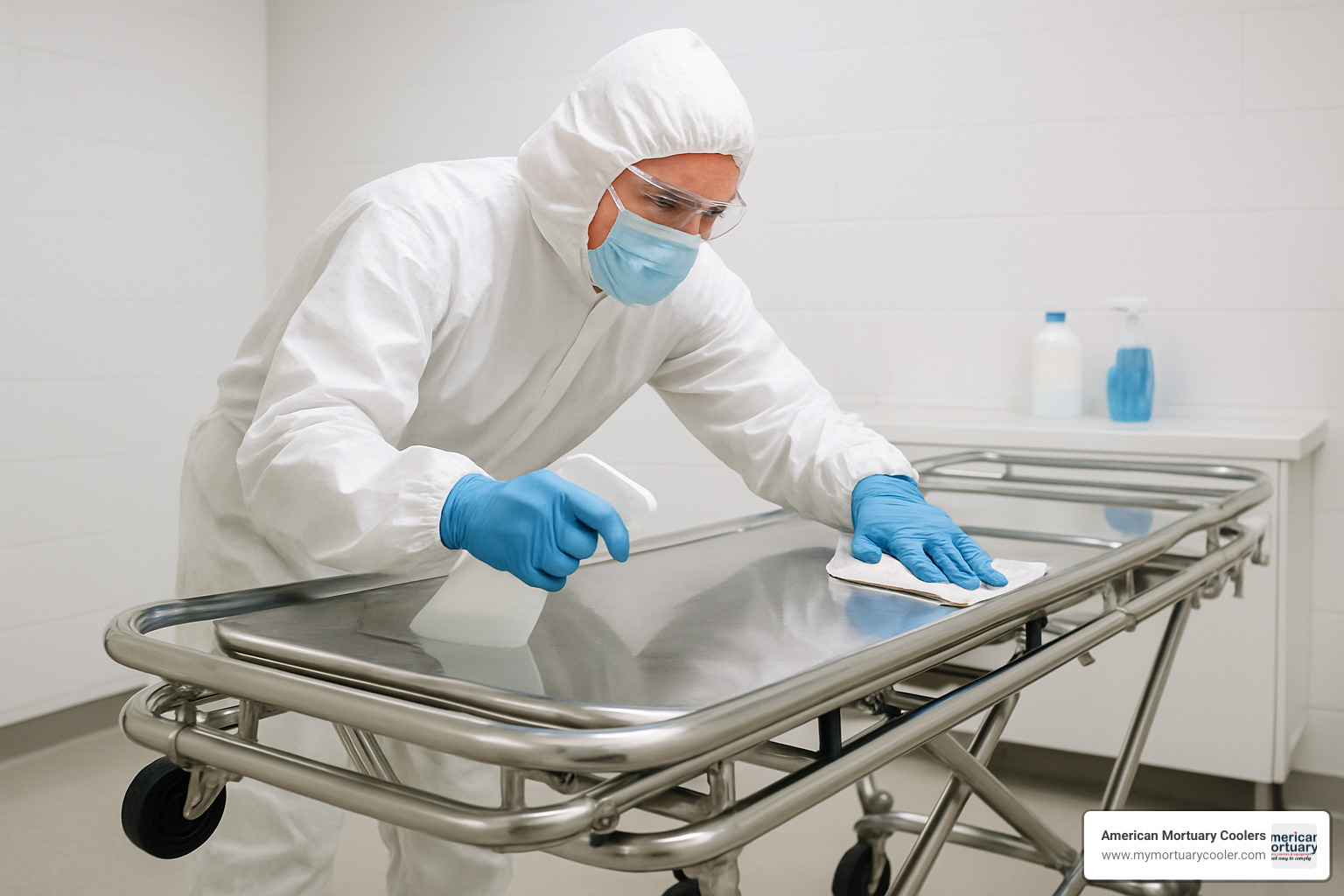Why Choosing the Right Mortuary Cot is Critical for Your Funeral Home
A mortuary-cot- is a specialized wheeled stretcher designed for the dignified transport of deceased individuals during first-call removals and funeral-home operations. These essential pieces of equipment feature multi-level height adjustment, enabling single-person operation, reducing back strain, and ensuring safe transport from various locations to funeral facilities.
Key mortuary cot specifications at a glance:
- Weight capacity: 400-1,000+ lbs depending on model type
- Height range: Typically 9-32 inches with 6+ adjustment levels
- Standard dimensions: 76" length × 19" width on average
- Price range: $1,095-$4,400 based on features and capacity
- Key certifications: FDA, CE, and ISO 9001 compliance required
- Essential accessories: Cot covers, restraint straps, slider boards
Early funeral directors relied on heavy wooden biers. Today’s aluminum-frame cots with smooth hydraulic mechanisms focus on ergonomic design and one-person operation, helping funeral teams work efficiently even with limited staff.
As one customer noted: "We already used it for 450 pounds… was smooth and easy to operate." Feedback like this shows how the right equipment safeguards staff and preserves dignity for the families you serve.
Investing in quality mortuary cots pays dividends through fewer worker-comp claims, faster removals, and an improved professional image. With models spanning standard 500-lb units to bariatric 1,000-lb systems, selecting the best cot means weighing your facility’s typical caseload, vehicle clearance, and budget.
I'm Mortuary Cooler, a national-level supplier specializing in mortuary equipment, including mortuary-cot- solutions for funeral homes across the United States. Years of helping funeral directors choose durable, budget-friendly cots has shown me how the right choice directly improves operations and safety.

Simple mortuary-cot- glossary:
What Is a Mortuary Cot and Why Does It Matter?
When a funeral director receives that first call, having the right equipment can make all the difference between a smooth, dignified removal and a stressful situation that puts both staff and families at risk. A mortuary-cot- is far more than just a wheeled stretcher - it's a specialized piece of equipment designed specifically for the unique challenges of post-mortem transport.
Unlike ambulance stretchers, mortuary cots are engineered with the funeral industry's needs in mind. They handle the first-call removal process with grace, allowing funeral professionals to transport deceased individuals from hospitals, homes, or other locations back to the funeral facility safely and respectfully.
The real game-changer here is one-person operation. Modern mortuary cots feature sophisticated height adjustment systems that eliminate the need for multiple staff members during most removals. This isn't just convenient - it's essential when you're dealing with staffing challenges or late-night calls where backup isn't readily available.
Most quality mortuary cots offer multiple height levels - typically six different positions - that adapt to virtually any situation. Whether you're loading from a low hospital bed or dealing with a high SUV cargo area, the right cot adjusts to meet the challenge.
History & Evolution of the mortuary-cot-
The story of mortuary-cot- development mirrors the funeral industry's growing commitment to both staff safety and professional service. Early funeral directors relied on basic wooden biers - essentially glorified flat platforms with wheels that were heavy, awkward, and required multiple people to operate safely.
The shift to aluminum frames changed everything. This lightweight yet incredibly strong material made single-person operation possible for the first time. Aluminum also solved the corrosion problems that plagued earlier steel models, especially important when regularly cleaning with strong disinfectants.
The development of bariatric models represents the most recent evolution in mortuary cot design. As America's average body weight increased, funeral homes found themselves needing equipment that could safely handle larger individuals. Today's bariatric mortuary cots can manage loads exceeding 1,000 pounds while still offering the same ergonomic benefits.
Primary Purpose & Core Components
Every professional mortuary-cot- brings together five critical components. The frame serves as the foundation - typically crafted from lightweight aluminum alloy with reinforced stress points. Quality frames resist corrosion even after years of cleaning with mortuary disinfectants.
The undercarriage houses the system that provides smooth height adjustment enabling one-person operation. Premium models offer up to six height positions with whisper-quiet operation that maintains dignity during transport.
Professional-grade wheels make all the difference when navigating tight hallways or uneven surfaces. Look for 8-inch diameter wheels with ball bearings for longevity and secure locking mechanisms.
The mattress platform balances comfort with practicality. Most feature vinyl-covered foam that resists fluid penetration while providing appropriate support. The restraint system ensures secure transport while maintaining respect for the deceased.
mortuary-cot- Types, Sizes & Specifications
When you're shopping for a mortuary-cot-, understanding the different types available makes all the difference in finding equipment that truly fits your funeral home's needs.
| Cot Type | Weight Capacity | Height Range | Primary Use |
|---|---|---|---|
| Standard | 400-500 lbs | 9-32 inches | General removals |
| Bariatric | 1,000+ lbs | 9-34 inches | Oversized cases |
| High-Loading | 500-600 lbs | 12-36 inches | SUV/van loading |
| Mini/Folding | 350-400 lbs | 8-28 inches | Confined spaces |
| Multi-Level | 500-600 lbs | Variable | Versatile operations |
Standard mortuary cots handle about 80% of typical funeral home removals. These workhorses typically support 400 to 500 pounds and measure around 76 inches long by 19 inches wide. They're sized perfectly to fit through standard doorways and elevators while providing enough space for most individuals.
High-loading models have become increasingly popular as more funeral homes switch to SUVs and vans for removals. These cots reach higher than standard models, making it much easier to load into lifted cargo areas without straining your back.
Standard vs. Bariatric mortuary-cot-
The choice between standard and bariatric mortuary-cot- models comes down to weight capacity and deck size. Standard models like the popular MOBI F500 handle up to 500 pounds and cost around $1,095 - perfect for most removal situations.
Bariatric models such as the MOBI F1200 support over 1,000 pounds and feature much wider decks. Yes, they cost significantly more - often $2,000 to $3,000 - but they're absolutely essential when you need them.
The decision depends on your area's demographics and typical caseload. Some funeral homes find bariatric models necessary for regular operations, while others might only need them occasionally and choose to rent when required.
High-Loading & Tall Cots for SUVs and Vans
High-loading mortuary-cot- models solve a real problem many funeral directors face today. With more funeral homes using SUVs and vans for removals, standard cots often can't reach high enough for safe, easy loading.
The Ferno Model 24 offers a 24-inch loading height that works perfectly with most van and SUV cargo areas. This eliminates the dangerous lifting and awkward positioning that leads to back injuries during vehicle loading.
Rural funeral homes especially benefit from these models. When you're serving remote areas with rough roads, SUVs and high-clearance vehicles become necessary. High-loading cots ensure you can load these vehicles safely.
Folding & Mini Cots for Confined Spaces
Folding and mini mortuary-cot- models are lifesavers when dealing with tight spaces. Anyone who's tried to steer a standard cot through a narrow apartment hallway knows exactly why these specialized models exist.
The Ferno Mini Cot Roll-In Style features a compact design that transforms into a two-wheeled stretcher for stair navigation, complete with built-in stair guides for safe, controlled descent.
These specialized cots typically feature folding undercarriages that narrow for hallway navigation, then expand to full stability when needed. Weight capacity in mini cots usually ranges from 350 to 400 pounds.
Key Features & Accessories to Evaluate Before You Buy
Shopping for the perfect mortuary-cot- can feel overwhelming with so many options available. But focusing on a few key features will help you make the right choice for your funeral home's needs and budget.
Weight capacity should be your first consideration. While a 400-pound standard cot might seem adequate, you're not just supporting the deceased - you're also accounting for bedding, personal effects, and the reality that weight estimates aren't always accurate. Most funeral directors find that investing in a 500-pound capacity model provides the safety margin they need.
The height adjustability mechanism makes a huge difference in daily operations. Hydraulic systems offer whisper-quiet operation that maintains dignity during removals, but they do require occasional maintenance. Mechanical systems are virtually bulletproof and easy to service in the field.
Don't underestimate the importance of quality wheels. Cheap wheels will drive you crazy within months, squeaking through quiet hospital corridors or getting stuck on carpet transitions. Professional-grade wheels with sealed bearings roll effortlessly over any surface and resist damage from cleaning chemicals.
Material selection affects both how long your cot lasts and how easy it is to maintain. Aluminum frames stay lightweight while resisting corrosion from cleaning products. Stainless steel components in high-wear areas like latches and hinges extend service life significantly.
Certification requirements protect your business. FDA Class I registration is mandatory for mortuary equipment in the United States. CE Mark certification shows the manufacturer meets international safety standards. ISO 9001 certification indicates consistent quality control throughout production.

Must-Have mortuary-cot- Accessories
The right accessories transform a basic mortuary-cot- into a complete removal system. Cot covers top every funeral director's must-have list, protecting your investment during transport and storage while maintaining that professional appearance families expect.
Cot pouches solve the eternal problem of where to put all those removal essentials. Instead of juggling body bags, gloves, and paperwork, everything stays organized and within reach.
Body straps and restraints ensure safe transport while preserving dignity. The best systems feature quick-release mechanisms that work even with gloves on, plus adjustable lengths for different body sizes.
First-call covers provide that extra layer of protection and privacy during challenging removals. Look for flame-resistant materials and secure attachment systems that won't come loose during transport.
Need more details about the full range of available options? Check out more info about removal accessories to see what might work best for your specific needs.
Safety & Efficiency Gains for Funeral Professionals
Modern mortuary-cot- design puts staff safety first through smart ergonomic features that actually prevent injuries before they happen. The multi-level height adjustment eliminates those dangerous lifting situations that send funeral directors to physical therapy.
One-person operation capabilities are a game-changer for smaller funeral homes dealing with staffing challenges. As one of our customers put it: "The mortuary stretcher is great! We already used it for 450 pounds... was smooth and easy to operate."
Ergonomic handles positioned at natural grip heights reduce wrist strain during long transports. Quality handles feature non-slip surfaces that stay secure even when contaminated.

Special release levers let you adjust height without bearing the full weight of the deceased. This represents a huge advancement over older cots that required dangerous lifting during height changes.
Regulatory & Certification Checklist
Mortuary-cot- certification protects your business from serious liability issues. FDA Class I medical device registration provides the basic regulatory foundation for mortuary equipment in the United States - it's not optional.
CE Mark certification shows compliance with European safety standards, demonstrating the product meets rigorous international safety and quality requirements.
ISO 9001 certification tells you the manufacturer maintains proper quality management systems throughout production. It provides confidence in consistent product quality and ongoing support when you need parts or service.
Reputable manufacturers provide all necessary certifications with their equipment. Always verify certification status before making a purchase - it's much easier than dealing with compliance issues later.
Pricing, Brands, Financing & Ongoing Care
When it comes to mortuary-cot- pricing, you'll find options that fit most funeral home budgets. Entry-level models like the MOBI F500 Multi-Level start around $1,095 - perfect for smaller operations. Premium models such as the Ferno 24-Maxx can reach $4,344.95, but they come packed with advanced features that often pay for themselves through improved durability and performance.
The price difference isn't just about brand names. Higher-priced cots typically offer better weight capacities, smoother operation, and warranties that give you real peace of mind.
Three brands dominate the mortuary cot landscape. Ferno sits at the premium end with their 24-Maxx and Model 24 series. These cots are built like tanks and come with comprehensive warranties plus dealer networks that actually answer the phone when you need service.
MOBI hits the sweet spot for value-conscious funeral homes. Their F500 series delivers multi-level operation and solid construction without breaking the bank. Many of our customers across Tennessee and neighboring states have found these cots handle their daily needs beautifully.
Junkin specializes in the heavy-duty market. When you need something that can handle extreme weight or unusual situations, their "Tall" and "HD" models fill gaps that standard cots simply can't manage.
Most manufacturers back their equipment with 2-year warranties on hard goods and 90 days on soft goods. This coverage protects you from manufacturing defects while encouraging regular maintenance that keeps your investment running smoothly for years.
Financing & Leasing Options
Dropping several thousand dollars on a mortuary-cot- isn't always easy, especially when funeral home cash flow can be unpredictable. That's where equipment financing becomes a lifesaver for many funeral directors.
Many suppliers work with lenders who actually understand the funeral industry. These aren't generic business loan companies - they know your revenue patterns and structure payments accordingly. Scientific research on secure online payments shows that modern financing platforms are both safe and convenient.
Credit lines designed specifically for funeral equipment often beat general business loans. They understand that some months are busier than others, and they structure terms that work with your reality rather than against it.
Equipment loans typically require minimal down payments and offer terms from 3 to 7 years. Longer terms mean smaller monthly payments, but you'll pay more interest overall.
More info about financing mortuary equipment can walk you through the specific options and what you'll need to qualify.
Maintenance, Cleaning & Storage Best Practices
Taking care of your mortuary-cot- isn't complicated, but doing it right makes the difference between equipment that serves you well for years versus constant headaches and unexpected repairs.
Regular cleaning with proper disinfectants keeps your cot safe and professional-looking. The key is using products that kill germs without damaging metal frames or vinyl surfaces.
Wheel maintenance tops the priority list for good reason. Quality cots have sealed bearings that need periodic lubrication to stay smooth and quiet. Neglected wheels don't just become hard to push - they get noisy and make you look unprofessional during removals.
Height adjustment mechanisms need attention too. If you have hydraulic systems, check fluid levels and watch for leaks around seals. Mechanical systems need lubrication at pivot points and adjustment mechanisms.

Simple inspection logs help you stay on top of maintenance schedules. You don't need anything fancy - just a checklist covering wheels, height adjustment, restraints, and overall condition.
When it comes to storage, indoor climate-controlled areas extend equipment life significantly. Temperature extremes and moisture damage hydraulic seals and metal components faster than normal wear and tear.
Best Practices for Using and Transporting Cots in Real-World Settings
Every funeral director knows that mortuary-cot- operation looks different in the real world than it does in the showroom. When you're navigating the narrow hallway of a 1920s apartment building at 2 AM, or maneuvering through a busy hospital corridor during shift change, your equipment needs to perform flawlessly under pressure.
Private homes present some of the most challenging scenarios. You'll encounter tight doorways that barely accommodate a standard 19-inch cot width, sharp corners that require careful pivoting, and staircases that demand specialized techniques.
Hospital removals bring their own set of challenges. Elevator access during peak hours, coordination with medical staff, and maintaining professional appearance in a clinical setting all require skill and proper equipment. This is where the quiet operation of quality wheels and smooth height adjustment mechanisms really matter.
One experienced funeral director shared about their Ferno Model 24: "Excelente equipo" - excellent equipment that has served their facility for over 25 years with only routine maintenance. That kind of reliability becomes invaluable when you're handling sensitive situations in public settings.
Loading & Unloading Techniques to Protect Staff
Proper loading and unloading techniques can mean the difference between a smooth operation and a career-ending back injury. The first rule is simple: always engage wheel locks before any transfer. Those few seconds of preparation prevent the cot from rolling away during critical moments.
Release levers are your best friend when used correctly. These mechanisms allow smooth height adjustment without you bearing the full weight of the deceased. The key is operating them deliberately and smoothly - never rush this step.
Slider boards deserve special mention as true back-savers. These transfer aids feature up to 14 grip handles and facilitate smooth transfers between surfaces. Many suppliers include a Pro Slider Board free with cot purchases, saving you over $100 while dramatically improving transfer safety.
Your body positioning during cot operation matters more than you might think. Keep the load close to your body, maintain proper lifting posture, and use the cot's height adjustment features to minimize actual lifting.
Special Considerations for Oversized Cases
Bariatric and oversized cases require both specialized equipment and modified procedures. The MOBI F1200 Multi-Level Bariatric Mortuary Stretcher, with its 1,000+ pound capacity, represents the current gold standard for heavy-duty applications, but even the best equipment requires proper technique.
Dual-operator protocols become essential for extremely large individuals. Even with appropriate bariatric equipment, two-person teams provide better control and significantly reduce individual injury risk.
Vehicle considerations become critical with oversized cases. Your removal vehicle needs wider doorways, reinforced floors, and possibly specialized loading equipment. Weight distribution affects both the cot's performance and your vehicle's handling.
The reality is that bariatric cases are becoming more common, not less. Having the right mortuary-cot- and knowing how to use it properly protects both your staff and your ability to serve families with dignity.
Frequently Asked Questions about Mortuary Cots
How is a mortuary cot different from an ambulance stretcher?
While both pieces of equipment transport people, a mortuary-cot- serves a completely different purpose than an ambulance stretcher. Ambulance stretchers are built for speed and medical access during emergencies, while mortuary cots prioritize dignity and careful handling.
The height adjustment systems tell the whole story. Mortuary cots feature specialized multi-level mechanisms designed for loading into funeral vehicles and hearses. Ambulance stretchers focus on quick loading into ambulances and providing medical personnel with easy patient access.
Weight capacity represents another major difference. Mortuary cots often handle much higher static loads - sometimes over 1,000 pounds for bariatric models. Ambulance stretchers typically max out around 700 pounds since they're designed for living patients.
The materials and cleaning requirements differ too. Mortuary-cot- surfaces withstand repeated cleaning with strong mortuary disinfectants, while ambulance stretchers need quick turnaround cleaning between emergency calls.
What weight capacity should I choose for my firm's caseload?
This question keeps funeral directors up at night, and for good reason. Choose too low, and you'll face dangerous situations. Choose too high, and you've overspent on features you rarely need.
Standard 400-500 pound capacity cots handle about 85% of typical cases effectively. The MOBI F500 with its 500-pound capacity hits the sweet spot for most funeral homes - reliable, affordable, and adequate for the majority of removals.
Your service area demographics matter more than you might think. Rural areas with older populations might get by with standard models, while urban areas with higher obesity rates often need the MOBI F500 Tall model's 600-pound capacity or even full bariatric models.
Bariatric models with 1,000+ pound capacities cost significantly more - often double the price of standard cots. Before investing in one, honestly evaluate your caseload. Do you handle oversized cases monthly or just a few times per year?
Consider future trends too. American demographics suggest larger individuals are becoming more common, so a slightly higher capacity might prove wise even if your current caseload doesn't demand it.
Are mortuary cots required to be FDA registered?
Yes, mortuary-cot- equipment falls under FDA Class I medical device regulations in the United States. This isn't just bureaucratic paperwork - it's your legal protection and quality assurance.
FDA registration ensures basic safety standards while protecting your funeral home from liability issues. Non-compliant equipment can create serious problems during health department inspections or insurance claims.
Here's what many funeral directors don't realize: FDA registration doesn't guarantee quality or performance. It simply confirms the manufacturer has registered the device and follows basic manufacturing practices. Think of it as the minimum standard, not a quality seal.
Look for additional certifications like CE Mark and ISO 9001 for higher quality assurance. These international standards indicate more rigorous manufacturing controls and quality systems.
Always verify FDA registration status before purchasing any mortuary equipment. Reputable suppliers provide all necessary documentation with their equipment.
Conclusion
Choosing the right mortuary-cot- isn't just about buying equipment - it's about investing in your team's safety, your operational efficiency, and the dignity you provide to families during their most difficult moments. Whether you're considering a standard 500-pound capacity model starting around $1,095 or need a specialized bariatric unit handling 1,000+ pounds at $4,400, the perfect cot for your funeral home exists within this range of options.
Here at American Mortuary Coolers, we've spent years helping funeral homes across Tennessee, Georgia, Illinois, and beyond find the equipment that truly fits their needs. What we've learned is simple: the right mortuary-cot- doesn't just move people - it transforms how your entire operation runs. Your staff feels more confident, your removals go smoother, and families notice the professional difference.
Think about how far we've come from those old wooden biers that required three people and a prayer to operate safely. Today's sophisticated multi-level cots with their FDA certification, ISO 9001 compliance, and thoughtful ergonomic design represent decades of listening to funeral professionals like you. Features like one-person operation, smooth release levers, and built-in stair guides weren't added because they sounded cool - they solve real problems you face every single day.
The benefits speak for themselves through reduced back injuries, faster removal times, and that polished professional appearance that builds trust with families. As one of our customers put it: "The quality with the hydraulic embalming table is above and beyond what I expected!" That's the kind of satisfaction that comes from investing in equipment that actually works the way it should.
Your specific needs might call for a standard cot for everyday removals, a high-loading model that plays nice with your SUV fleet, or a bariatric unit for those challenging cases. Whatever you choose, quality equipment backed by solid 2-year warranty coverage and proper maintenance will serve your funeral home reliably for decades to come.
We specialize in creating durable, custom solutions that get delivered directly to your door anywhere in the contiguous 48 states. Our team understands the funeral industry because we've been part of it, and we're committed to providing not just quality equipment, but the kind of professional service that makes your job easier.
Ready to see how the right mortuary equipment can improve your operations? More info about our mortuary solutions will show you our complete range of funeral equipment and help you find exactly how we can support your facility with quality, value, and the kind of service that actually makes sense.
















